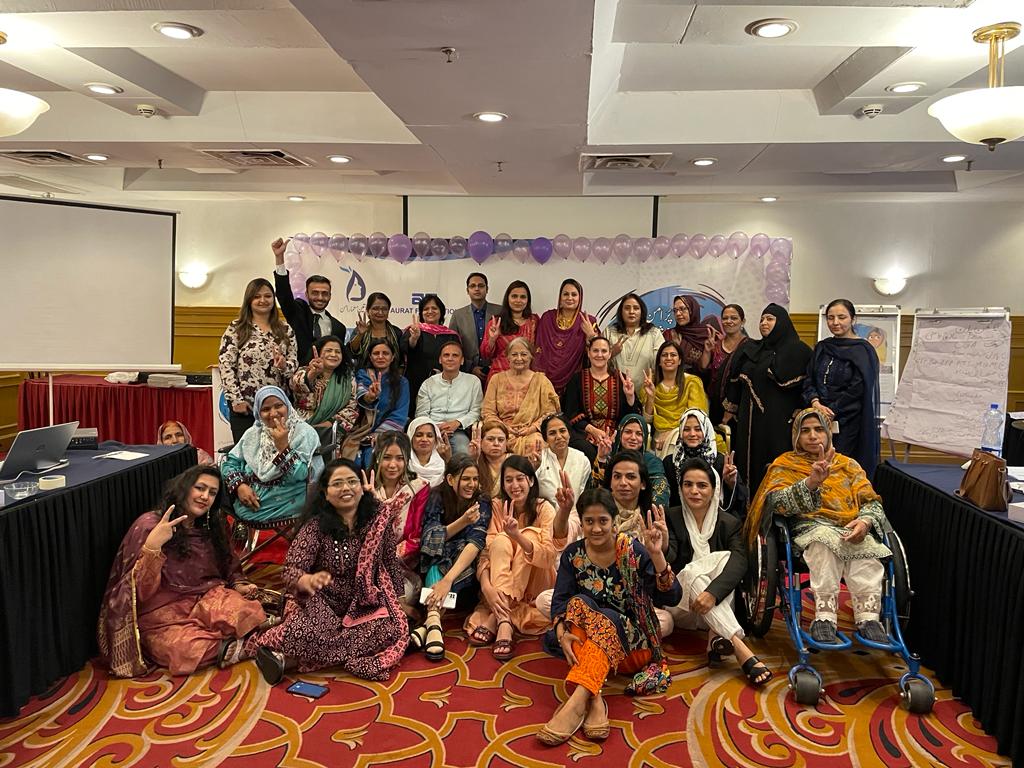
08-03-2023
Karachi
Understanding of Radicalization and Best Practices of Gender Engagement in PVE
Aurat Foundation organized a three-day workshop for WPAs of Sindh and Balochistan on the Common Ground Approach, Understanding of Radicalization, and Best Practices of Gender Engagement in PVE on 6-8 March 2023 at Marriott Hotel Karachi. The main objectives of the CGA training workshop were; to straighten the capacities of WPAs on a common-ground approach, to offer guidance and strengthen the capacities of WPAs in peacebuilding and conflict prevention, and to reflect on conflict in own their lives, to explore the different approaches to managing conflict, to enhance their skills and knowledge regarding counter-violent extremism in Pakistan's context" and Motivating the WPAs to actions for changing behavior after receiving the CGA workshop at the personal, community, and workplace levels.
Based on their learnings, WPAs developed their action plans to replicate the training in their respective communities and circle of influence.
The closing ceremony was attended by the guests; Dr. Masuma Hasan, President, Board of Directors, Aurat Foundation, Ms. Anastasia Kolivas, Public Diplomacy Officer, US Consulate Karachi, Ms. Gulshan Batool, Community Engagement Assistant, US Embassy Islamabad, Ms. Mahnaz Rahman, Resident Director Aurat Foundation Karachi & Ms. Muneezeh Saeed Khan, Programme Specialist, AF Karachi. Addressing the closing ceremony, Dr. Masuma Hassan, President, Board of Directors, Aurat Foundation thanks Search for Common Ground and the US Embassy for their generous support for such important and wonderful work.
Dr. Masuma Hasan, President, Board of Directors, Aurat Foundation shared that in 2000, the United Nations Security Council (UNSC) adopted Resolution 1325, the first time the international community formally recognized either the impact of conflict on women or the need to involve them as active agents in peacebuilding. UNSC Resolution 1325 made an important contribution to the normative framework for the protection of women and girls in armed conflict. She said that In its first National Security Policy (2022-2026), the Government of Pakistan recognized 'gender security' as a key pillar and aimed to "ensure integration of gender equity into national security narratives through full and meaningful participation of women in decision-making, law enforcement, justice sector, and peacekeeping.
Mahnaz Rehman, Resident Director, Aurat Foundation, Sindh said that in a society such as Pakistan, where patriarchal norms and structural inequalities have restricted women and girls to the margins of the society, entrenched challenges hinder women's meaningful participation in public and political spheres. Existing inequalities exacerbate sociocultural differences and disparities in access to rights and services, magnifying the gender divide in conflict and crisis scenarios. There is a need to strengthen local women's groups and CSOs towards building a peace network of local organizations, building their knowledge and capacity on conflict prevention, and implementing gender-sensitive interventions.
Ms. Gulshan Batool, Community Engagement Assistant, US Embassy Islamabad apricated and spoke high words for Aurat Foundation and SFCG for organizing very learning workshops for WPAs. She said that the US Embassy is working to strengthen women's capacities for promoting peacebuilding. They are working with local organizations for socio-economic recovery and building their skills to strengthen women's leadership. The CGA workshop is a unique training to build the skills of WPAs.
Mr. Shahid Rahim, Senior Manager Programs SFCG thanks AF for the selection of wonderful WPAs for the promotion of peace. He said that exclusion from democratic processes, cultural norms, social biases, and militant violence further dissuade youth and women's participation in the civic space. There is also a need to give a voice to women and to involve them in meaningful decision-making; change itself requires a transformation of patriarchy-ridden culture, procedures, strategic narratives, and support system and an evolution in perceiving personal commitments.
Ms. Mumtaz Mughal said that the project will also provide platforms and spaces for WPAs to improve their joint influence and expertise in the peace process. She further said that women's equal participation in decision-making is not only a demand for justice and democracy but can also be seen as a necessary condition for women's interests to be considered. Without the perspective of women at all levels of decision-making, the goals of equality, development, and peace cannot be achieved. In the end, the guests of the workshop awarded the certificates to WPAs. AF team presented the souvenirs to the guests. A group photo was also taken.
|

